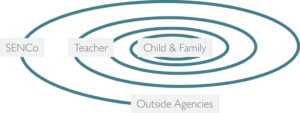About Us
We provide:
- An informal advice and guidance consultation system, enabling schools to access the team’s expertise at an early stage.
- Assessments for appropriate children referred by mainstream schools following completion of the consultation process.
- Written reports for schools and parents/carers, including tailored recommendations.
- Structured programmes of work to support children with sound awareness, phonics, reading, spelling, or numeracy, alongside classroom strategies to aid learning.
- Advice and resources to help schools deliver effective support programmes.
- For a small number of pupils with significant, persistent needs, we may provide time-limited weekly teaching within schools. During this period, we work alongside school staff to model strategies and provide informal training.
- Training opportunities for whole schools, staff groups, individual teachers, and external agencies.
Dyslexia is a set of processing difficulties that affect the acquisition of reading and spelling.
In dyslexia, some or all aspects of literacy attainment are weak in relation to age, standard teaching and instruction, and level of other attainments. Across languages and age groups, difficulties in reading and spelling fluency are a key marker of dyslexia. Dyslexic difficulties exist on a continuum and can be experienced to various degrees of severity. The nature and developmental trajectory of dyslexia depends on multiple genetic and environmental influences. Dyslexia can affect the acquisition of other skills, such as mathematics, reading comprehension or learning another language.
The most commonly observed cognitive impairment in dyslexia is a difficulty in phonological processing (i.e. in phonological awareness, phonological processing speed or phonological memory). However, phonological difficulties do not fully explain the variability that is observed. Working memory, processing speed and orthographic skills can contribute to the impact of dyslexia. Dyslexia frequently co-occurs with one or more other developmental difficulties, including developmental language disorder, dyscalculia, ADHD, and developmental coordination disorder.
Referrals
Schools follow a 3 stage consulation process before a formal referral is sent to the team.

The referral system reflects the Special Educational Needs and Disability (SEND) Code of Practice, ensuring children’s needs are identified, supported, and reviewed appropriately.
If the referral suggests a pupil has specific literacy or numeracy difficulties, a specialist teacher will contact the school to arrange an assessment.
Where needs appear less severe, the team will offer informal advice and targeted resources to support school-based intervention.
*Note: The team’s consultation system is open to pupils aged 7 and above but formal referrals are only available for pupils from Year 3 onwards for both literacy and numeracy concerns
Meeting with parents and supporting schools
- After an initial assessment, the specialist teacher will make up to three attempts to contact parents/carers by phone to discuss findings and gather their views.
- A written report containing the assessment outcomes and recommendations will be sent to parents via the school.
- Each report includes a teaching intervention plan to help the pupil make progress; some strategies can also be supported at home.
- Evidence shows that individualised, regularly delivered programmes are most effective in addressing specific learning difficulties.
- The team remains available to provide further informal advice upon school request.
- If difficulties persist, schools may re-refer pupils after 18 months following the initial assessment.
Current information: Dyslexia and Dyscalculia
- Dyslexia refers to persistent difficulties with phonics, reading accuracy, and spelling.
- Dyscalculia refers to persistent difficulties with number sense and numerical understanding.
- Both are specific learning difficulties that can occur across the full range of abilities.
- The Dyslexia Team does not provide formal diagnoses of dyslexia or dyscalculia. Instead, our role is to identify specific learning difficulties and develop targeted programmes to support pupils’ progress.
